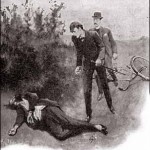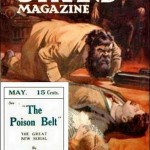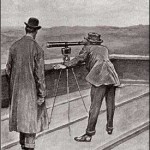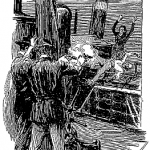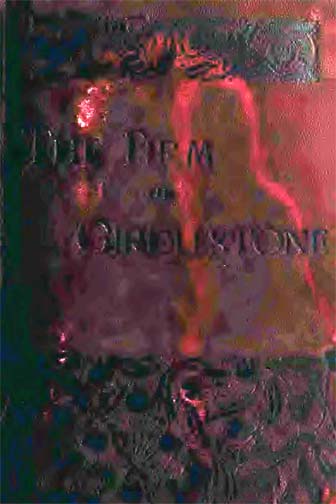
It was already dusk when John Girdlestone and his ward reached Waterloo Station. He gave orders to the guard that the luggage should be stamped, but took care that she should not hear the name of their destination. Hurrying her rapidly down the platform amid the confused heaps of luggage and currents of eager passengers, he pushed her into a first-class carriage, and sprang after her just as the bell rang and the wheels began to revolve.
They were alone. Kate crouched up into the corner among the cushions, and wrapped her rug round her, for it was bitterly cold. The merchant pulled a note-book from his pocket and proceeded by the light of the lamp above him to add up columns of figures. He sat very upright in his seat, and appeared to be as absorbed in his work as though he were among his papers in Fenchurch Street. He neither glanced at his companion nor made any inquiry as to her comfort.
As she sat opposite to him she could not keep her eyes from his hard angular face, every rugged feature of which was exaggerated by the flickering yellow light above him. Those deep-set eyes and sunken cheeks had been familiar to her for years. How was it that they now, for the first time, struck her as being terrible? Was it that new expression which had appeared upon them, that hard inexorable set about the mouth, which gave a more sinister character to his whole face? As she gazed at him an ineffable loathing and dread rose in her soul, and she could have shrieked out of pure terror. She put her hand up to her throat with a gasp to keep down the sudden inclination to cry out. As she did so her guardian glanced over the top of the note-book with his piercing light grey eyes.
“Don’t get hysterical!” he cried. “You have given us trouble enough without that.”
“Oh, why are you so harsh?” she cried, throwing out her arms towards him in eloquent entreaty, while the tears coursed down her cheeks. “What have I done that is so dreadful? I could not love your son, and I do love another. I am so grieved to have offended you. You used to be kind and like a father to me.”
“And a nice return you have made me! ‘Honour your father,’ says the good old Book. What honour did you give me save to disobey every command which I have ever given you. I have to blame myself to some extent for having allowed you to go on that most pernicious trip to Scotland, where you were thrown into the company of this young adventurer by his scheming old fool of a father.”
It would have been a study for a Rembrandt to depict the craggy, strongly lined face of the old merchant, and the beautiful pleading one which looked across at him, with the light throwing strange shadows over both. As he spoke she brushed the tears from her eyes and an angry flush sprang to her cheeks.
“You may say what you like of me,” she said bitterly. “I suppose that is one of your privileges as my guardian. You have no right, however, to speak evil of my friends. ‘He who calleth his brother a fool,’ I think the good old Book says something of that.”
Girdlestone was staggered for a moment by this unexpected counter. Then he took off his broad-brimmed hat and bowed his head with drooping lids.
“Out of the mouths of babes and of sucklings!” he cried. “You are right. I spoke too warmly. It is my zeal for you which betrays me.”
“The same zeal which made you tell me so many things which I now know to be untrue about Mr. Dimsdale,” said Kate, waxing more fearless as her mind turned to her wrongs.
“You are becoming impertinent,” he answered, and resumed his calculations in his note-book.
Kate cowered back into her corner again, while the train thundered and screeched and rattled through the darkness. Looking through the steamy window, nothing was to be seen save the twinkle here and there of the lights of the scattered country cottages. Occasionally a red signal lamp would glare down upon her like the bloodshot eye of some demon who presided over this kingdom of iron and steam. Far behind a lurid trail of smoke marked the way that they had come. To Kate’s mind it was all as weird and gloomy and cheerless even as the thoughts within her.
And they were gloomy enough. Where was she going? How long was she going for? What was she to do when there? On all these points she was absolutely ignorant. What was the object of this sudden flight from London? Her guardian could have separated her from the Dimsdales in many less elaborate ways than this. Could it be that he intended some system of pressure and terrorism by which she should be forced to accept Ezra as a suitor. She clenched her little white teeth as she thought of it, and registered a vow that nothing in this world would ever bring her to give in upon that point. There was only one bright spot in her outlook. When she reached her destination she would at once write to Mrs. Dimsdale, tell her where she was, and ask her frankly for an explanation of their sudden silence. How much wiser if she had done so before. Only a foolish pride had withheld her from it.
The train had already stopped at one large junction. Looking out through the window she saw by the lamps that it was Guildford. After another interminable interval of clattering and tossing and plunging through the darkness, they came to a second station of importance, Petersfield. “We are nearing our destination,” Girdlestone remarked, shutting up his book.
This proved to be a small wayside station, illuminated by a single lamp, which gave no information as to the name. They were the only passengers who alighted, and the train rolled on for Portsmouth, leaving them with their trunks upon the dark and narrow platform. It was a black night with a bitter wind which carried with it a suspicion of dampness, which might have been rain, or might have been the drift of the neighbouring ocean. Kate was numb with the cold, and even her gaunt companion stamped his feet and shivered as he looked about him.
“I telegraphed for a trap,” said he to the guard. “Is there not one waiting?”
“Yes, sir; if you be Mister Girdlestone, there’s a trap from the Flyin’
Bull. Here, Carker, here’s your gentleman.”

